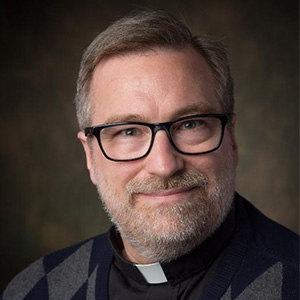
Fr. Joseph G. Mueller, S.J. (Submitted photo)
On July 23, 1967, at the end of a colloquium in Land O’ Lakes, Wisconsin, two bishops, 20 priests, and five lay people signed a 10-paragraph document entitled “Statement on the Nature of the Contemporary Catholic University,” often called the Land O’ Lakes Agreement. Among the signers of the statement were officers from 13 Catholic institutions of higher education in Canada, Peru, Puerto Rico and the United States.
Their statement became a major reference point for the development of a new self-image and place in the Church for American Catholic universities after Vatican II. The changes this process brought helped to give rise to a worldwide conversation in the 1980s on the role of Catholic universities in the Church. In response to those conversations, Pope Saint John Paul II unveiled in 1990 the framework law — called an apostolic constitution — governing these institutions. It was entitled Ex Corde Ecclesiae (Latin for “from the heart of the Church”) and is still available on the Vatican website at https://tinyurl.com/o65rw3w.
Both of these documents present perspectives on Catholic identity and academic freedom in Catholic universities. Like other institutions in the Church, Catholic universities have in recent years developed what they call “mission statements” to express their Catholic identity. But, the Catholic identity of any institution is based on a mystery because the Church itself is a mystery. Our identity as Catholics is wrapped up in our human response as a group to God’s gift of Himself in the Gospel, the sacraments and His other interaction with us. Just as for any mystery, no formula or description can furnish a complete presentation of the Church’s identity or that of a Catholic university. The best we can do is to be about the divine and human business of the Church or the university, trying to tell ourselves and others at regular intervals something of what that business is. It is the whole package of the Church’s or the university’s life, including its explicit statements about itself, that will most adequately express what their Catholic identity is. As helpful as mission statements might be in this process, we cannot reduce the Catholic identity of a university to a supposedly clear statement about faith or justice, or to a set of bullet points on a webpage. If a university is Catholic, its identity will ultimately frustrate every attempt to encapsulate it in human expression, as does any mystery rooted in the God of Jesus Christ.
We can hardly expect a Catholic university with such roots to think of the autonomy of its professors, often called academic freedom, the way any other university might. The usual idea of academic freedom conceives of it as protecting all the academic work of a university professor from the control of non-academic people, be they university administrators or trustees, or authorities of Church or State. The ideal is that professors should be hired, promoted, and evaluated by their colleagues alone; their profession forms the only community that should play a role in their academic work. But another community, namely, the Church, plays a key role in the scholarly work of Catholic university professors, for a Catholic university is an institution of the Church, a part of the Church’s efforts to be itself.
So the academic freedom of professors at a Catholic university includes their relationship to the local church, including the head of that church, who is the bishop. On one hand, the bishop’s role as pastor for a Catholic university needs to include respecting the autonomy of that institution’s teachers and researchers so that they can follow where their search for truth leads them, which is an important way for the Church to be itself. On the other hand, the teaching and research of professors at a Catholic university represent the lifeblood of an institution that comes out of the Church’s heart, which is its life as a hearer and doer of God’s word coming to us through Jesus Christ and His Spirit, and in part through the pastoral oversight of the bishops and pope.
American culture wants its institutions ever more precisely defined by ever more detailed rules. Nowhere is this trend more obvious than in schools and universities, as one can see by glancing on the web at the constantly updated, expanded, and refined mass of federal laws, regulations and guidelines for these places. Catholic educational institutions in this country should not try to buck this trend entirely. But we should resist it enough to remember that the mystery of God’s ways with the human race is the indefinable core of any Catholic school. And, we cannot forget that respectful and patient conversation is the only environment in which we can write and apply worthwhile rules governing an academic freedom that really works for Catholic universities.
Fr. Joseph G. Mueller, S.J.,
is an associate professor of theology
at Marquette University.
